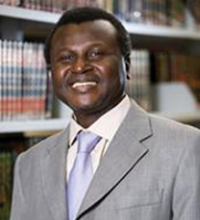
By Alhagi Manta Drammeh
The scene of the rampage and killing of harmless innocent students on a Kenyan University campus is condemned in the strongest terms. The act is Islamically abominable, unacceptable and has to be confronted head on. The attack of a Kenyan University campus by Al-Shabab is nothing but simple cowardice and callous inhumanity. Al-Shabab and their associates have made war an end in itself by causing havoc and terror from Somalia to Kenya. War is the last resort in Islam to defend oneself and a means to establish justice, the rule of law and to entrench human values of forgiveness and compassion. Moreover, wars are declared by states and not individuals or groups.
Islam teaches forgiveness and abhors revenge. Islam teaches compassion and love; and fights hatred and callousness. It teaches stability and detests anarchy.
Al-Shabab claims to promote Jihad. But they are in fact aloof from the worldview of Jihad. Jihad is a Qur’anic conception which is essentially about fighting against the ego, arrogance and other forms of inner ailments and diseases. In fact, the Prophet Muhammad [Peace Be Upon Him] refers to the Jihad of oneself as the bigger Jihad. I may call that in modern terms as the “soft Jihad” which is about promoting peace, plurality and prosperity. Jihad in its broader spiritual and ethical dimension includes the establishment of social justice and the strengthening of social bonds. Reflecting to the Qur’an, we can infer that concepts of dispensation of justice, promotion of plurality of ideas, religious tolerance and aversion of aggression are well embedded in its discourses. Peace in Islam is eternal and connected to the peace with oneself, the entire universe and the Creator. Indeed, social peace is an important element of stability, harmony and social cohesion. Consequently, a whole surah (chapter) is dedicated to developing a coherent methodology of how to manage conflict and prevent it. The Qur’an reminds us that: “He is Allah, and there is no God beside Him, the Knower of the unseen and the seen. He is the Gracious, the Merciful” (Al-hashr 59:23).
If and when wars are sanctioned, the rule of law in the light of rules of engagement has to be observed. The early Muslim scholars referred to the above rules as ethics of war. In fact, the Prophet of Islam laid solid foundations for his followers to abide by during the exceptional cases of war. He taught his followers not to kill the elderly, children, women or worshippers. He also warned them against arbitrary and indiscriminate killing, mutilation or burning of trees.
Education is key to promote understanding and keeping peace despite our differences politically, ideologically, religiously and racially. Difference and disagreement can be resolved in a peaceful environment. No doubt deprivation and social exclusion can be contributing factors to anger and violence. Therefore, education has to be enhanced at all levels. Similarly, efforts should be made to empower societies and communities in order that they can create positive change.
Surely, the Qur’anic discourse inculcates the culture of knowledge, reflection, reason and guidance to universal human norms of fraternity and universal standards against aggression and oppression. Islam is not only about rituals of praying and alms giving, but also is about dealing with our fellow human beings on the basis of kindness and fraternity. What happened in Kenya is against Islamic teachings and values. It does not represent Islam in any form or shape. It should not be seen as a war between Islam and Christianity. Muslims and Christians have coexisted peacefully in Africa for centuries. In fact, many families are divided between Muslims and Christians. Regardless of the distorted ideology of Al-Shabab and their associates, the difficult question would be why young people resort to such ideologies? Is it social and economic exclusion? Is it marginalisation, despair and ghettorization? Is it foreign or domestic policies? The above are some of the difficult questions that policy makers and social theoreticians need to consider and examine.
Dr. Alhagi Manta Drammeh is the Founder and Managing Director of Timbuktu International Research Centre (TIRC) in Scotland, UK.
Ends
